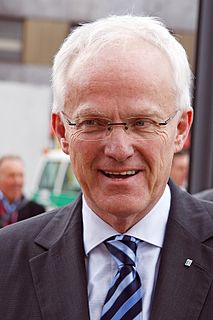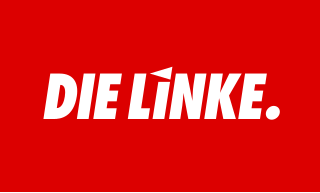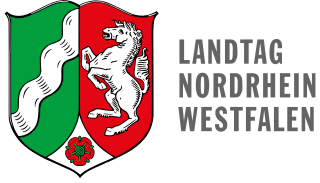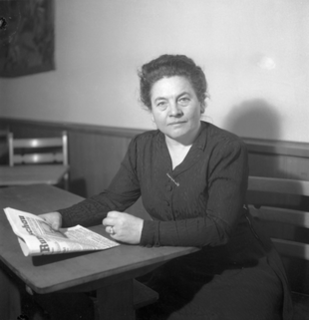
Germany is a democratic, federal parliamentary republic, where federal legislative power is vested in the Bundestag and the Bundesrat.

Alliance 90/The Greens, often simply referred to as the Greens, is a green political party in Germany. It was formed in 1993 as the merger of The Greens, formed in West Germany in 1980, and Alliance 90, formed in East Germany in 1990. The Greens had itself merged with the East German Green Party after German reunification in 1990.

Franz Müntefering is a German politician. He was Chairman of the Social Democratic Party (SPD) from 2004 to 2005 and again from 18 October 2008 to 13 November 2009. He served as Federal Minister of Labour and Social Affairs, as well as Vice-Chancellor, from 2005 to 2007.

The 2005 North Rhine-Westphalia state election was held on 22 May 2005 to elect the members of the Landtag of North Rhine-Westphalia. The incumbent coalition government of the Social Democratic Party (SPD) and The Greens led by Minister-President Peer Steinbrück was defeated. The Christian Democratic Union (CDU) became the largest party and formed a coalition with the Free Democratic Party (FDP). CDU leader Jürgen Rüttgers was subsequently elected Minister-President. This marked the first period of non-SPD government in the state since 1966.

The Left, also commonly referred to as the Left Party, is a democratic socialist political party in Germany. The party was founded in 2007 as the result of the merger of the Party of Democratic Socialism (PDS) and Labour and Social Justice – The Electoral Alternative (WASG). Through PDS, the party is the direct descendant of the Marxist-Leninist ruling party of the former East Germany (GDR), the Socialist Unity Party of Germany (SED).

The Landtag of Mecklenburg-Western Pomerania is the people's representative body or the state parliament of the German federal state of Mecklenburg-Western Pomerania. Thus it is also a constitutional body of the state.

The Landtag of North Rhine-Westphalia is the state parliament (Landtag) of the German federal state of North Rhine-Westphalia, which convenes in the state capital of Düsseldorf, in the eastern part of the district of Hafen. The parliament is the central legislative body in the political system of North Rhine-Westphalia. In addition to passing of laws, its most important tasks are the election of the Minister-President of the state and the administration of the government. The current parties of government are a coalition of the Christian Democratic Union (CDU) and the Free Democratic Party (FDP), supporting the cabinet of Minister-President Armin Laschet since June 2017.

Christian Wolfgang Lindner is a German politician, member of the Bundestag, and leader of the liberal Free Democratic Party of Germany (FDP).

Oliver Wittke is a German politician of the Christian Democratic Union (CDU).

Karl-Josef Laumann is a German politician of the Christian Democratic Union (CDU). Since 2017, he has been the State Minister of Labor, Health and Social Affairs of North Rhine-Westphalia, an office he previously held between 2005 and 2010.

The 2010 Rhine-Westphalia state election was held on 9 May 2010 to elect the members of the Landtag of North Rhine-Westphalia. The incumbent coalition government of the Christian Democratic Union (CDU) and Free Democratic Party (FDP) led by Minister-President Jürgen Rüttgers was defeated. The Social Democratic Party (SPD) subsequently formed a minority government with The Greens, led by SPD leader Hannelore Kraft, who became Minister-President.

The 2012 North Rhine-Westphalia state election was held on 13 May 2012 to elect the members of the Landtag of North Rhine-Westphalia. The incumbent minority government of the Social Democratic Party (SPD) and The Greens led by Minister-President Hannelore Kraft was returned with a majority and continued in office.

The Left of North Rhine-Westphalia is the chapter of the Left Party in the German federal state of North Rhine-Westphalia.

The 2017 North Rhine-Westphalia state election was held on 14 May 2017 to elect the members of the Landtag of North Rhine-Westphalia. The incumbent coalition government of the Social Democratic Party (SPD) and The Greens led by Minister-President Hannelore Kraft was defeated. The Christian Democratic Union (CDU) became the largest party and formed a coalition with the Free Democratic Party (FDP). CDU leader Armin Laschet was subsequently elected Minister-President.

Friederike Nadig was a German politician of the Social Democratic Party (SPD). One of the four women members of the Parlamentarischer Rat who drafted the Basic Law for the Federal Republic of Germany in 1948/49, she was one of the Mothers of the Basic Law.

Axel Schäfer is a German politician of the Social Democratic Party (SPD). Born in Frankfurt, Hesse, he has been serving as a member of the Bundestag from the state of North Rhine-Westphalia since 2002.

Markus Töns is a German politician of the Social Democratic Party (SPD) who has been serving as a member of the Bundestag from the state of North Rhine-Westphalia since 2017.
Alfred Gleisner was a German politician of the Social Democratic Party (SPD) and former member of the German Bundestag.

The Next North Rhine-Westphalia state election will be held no later than Spring 2022 to elect the 18th Landtag of North Rhine-Westphalia. The current government is coalition of the Christian Democratic Union (CDU) and Free Democratic Party (FDP) led by Minister-President Armin Laschet.

















